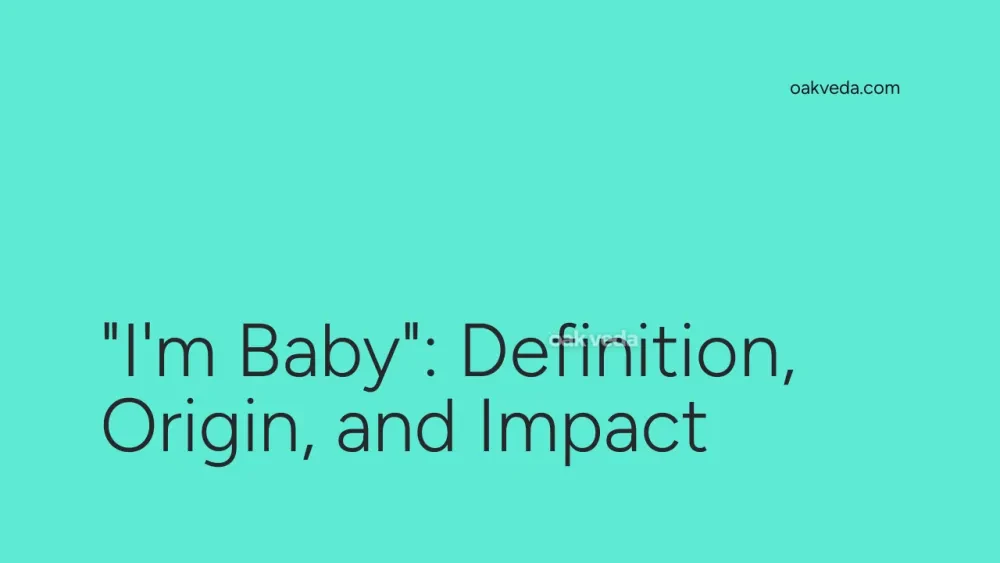
What is "I'm Baby"?
"I'm baby" is a popular internet slang phrase that has taken social media by storm. This playful expression is used to convey a sense of vulnerability, innocence, or helplessness in a lighthearted and often humorous way. When someone says "I'm baby," they're essentially embracing a childlike persona, expressing a desire for comfort, care, or a temporary escape from adult responsibilities.
Origin and Development of "I'm Baby"
The phrase "I'm baby" originated from a meme that gained traction on various social media platforms, particularly Twitter and Instagram. While the exact origin is difficult to pinpoint, the expression began circulating widely in the late 2010s. It quickly evolved from a simple meme into a versatile catchphrase used across different contexts in online communication.
How "I'm Baby" Works
The beauty of "I'm baby" lies in its simplicity and versatility. Users employ this phrase in various situations:
- Seeking comfort: "I'm having a tough day. I'm baby, I need cuddles."
- Avoiding responsibilities: "I can't do my taxes, I'm baby."
- Expressing vulnerability: "I'm baby, please explain this complicated topic to me."
- Self-deprecating humor: "I tried to cook dinner but burned everything. I'm baby in the kitchen."
The phrase works by creating a stark contrast between the speaker's actual age or expected capabilities and the infantile persona they're adopting. This juxtaposition often results in humor and relatability.
Popular Examples of "I'm Baby"
The "I'm baby" phenomenon has spawned countless memes, tweets, and social media posts. Some popular examples include:
- "I'm baby, I don't know how to file taxes."
- "When the waiter asks if I want the adult menu or kids menu: I'm baby."
- "I'm baby, I can't handle confrontation."
- "My boss: Can you stay late today? Me: Sorry, I'm baby. I have a 7 PM bedtime."
These examples showcase how the phrase is used to humorously deflect responsibilities or express a desire for simpler, more carefree experiences.
Impact of "I'm Baby" on Social Media Culture
The "I'm baby" trend has had a significant impact on social media culture:
- Embracing vulnerability: It has encouraged users to be more open about their insecurities and moments of weakness.
- Challenging age expectations: The phrase pushes back against societal pressures to always appear competent and in control.
- Creating community: Users bond over shared experiences of feeling overwhelmed or unprepared for adult life.
- Evolving language: "I'm baby" has contributed to the ever-changing landscape of internet slang and meme culture.
How Brands and Influencers Use "I'm Baby"
Savvy brands and influencers have caught on to the "I'm baby" trend, incorporating it into their social media strategies:
- Relatable content: Influencers use the phrase to appear more approachable and human to their followers.
- Marketing campaigns: Brands targeting younger demographics have used "I'm baby" in ads to connect with their audience.
- Product promotion: Companies selling comfort items or self-care products have leveraged the phrase to appeal to consumers' desire for nurturing experiences.
Future Trends Related to "I'm Baby"
As with many internet trends, the future of "I'm baby" is uncertain. However, we can speculate on potential developments:
- Evolution of the phrase: Like many slang terms, "I'm baby" may evolve or spawn related expressions.
- Integration into mainstream culture: The phrase could find its way into more traditional media and everyday language.
- Backlash or saturation: As with any popular trend, there's a possibility of overuse leading to fatigue or backlash.
FAQs about "I'm Baby"
Q: Is "I'm baby" only used by young people? A: While it's more common among younger social media users, people of various ages use the phrase, often ironically.
Q: Can "I'm baby" be used in professional settings? A: It's generally not appropriate for formal or professional contexts, as it's considered casual internet slang.
Q: Is there a deeper meaning behind "I'm baby"? A: Some argue that the phrase reflects broader societal issues, such as delayed adulthood or increased anxiety among younger generations. However, it's primarily used as a lighthearted expression.
Q: How do you respond to someone saying "I'm baby"? A: Responses often play along with the childlike persona, offering comfort or understanding. For example, "Aww, do you need a nap?" or "It's okay, let's get you some snacks."
In conclusion, "I'm baby" has become a significant part of internet culture, offering users a playful way to express vulnerability and seek comfort in the often overwhelming world of adulthood. As social media continues to evolve, it will be interesting to see how this phrase and similar expressions shape online communication and reflect broader societal trends.
You may be interested in:
- Sleep On: Definition, Origin, and Impact on Social Media
- Hoo.be: Definition, Origin, and Impact on Creator Marketing
- Big Yikes: Definition, Origin, and Impact on Social Media
- Ok Boomer: Definition, Origin, and Cultural Impact
- Komi: Definition, Origin, and Impact on Creator Marketing
- SMB: Definition, Origin, and Impact on Social Media Marketing

